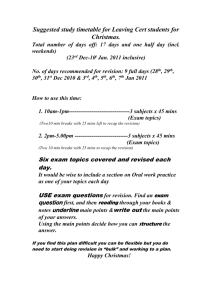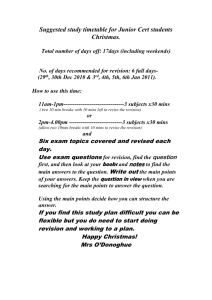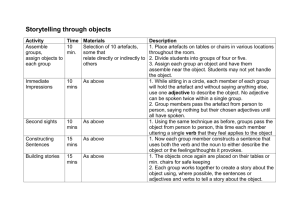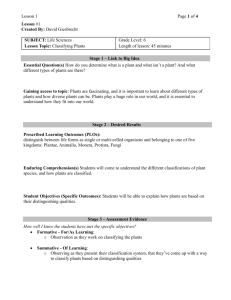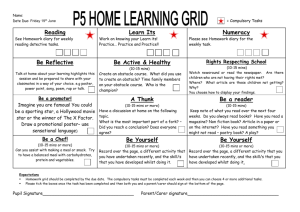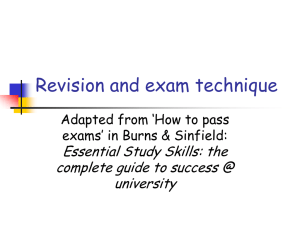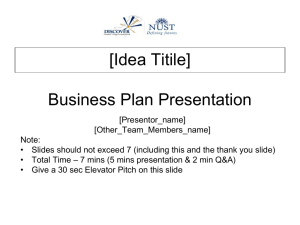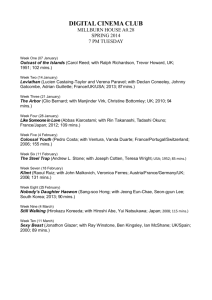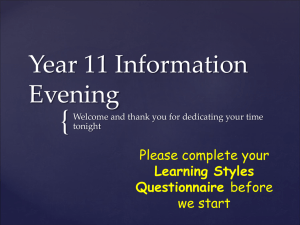ED209_tut6
advertisement
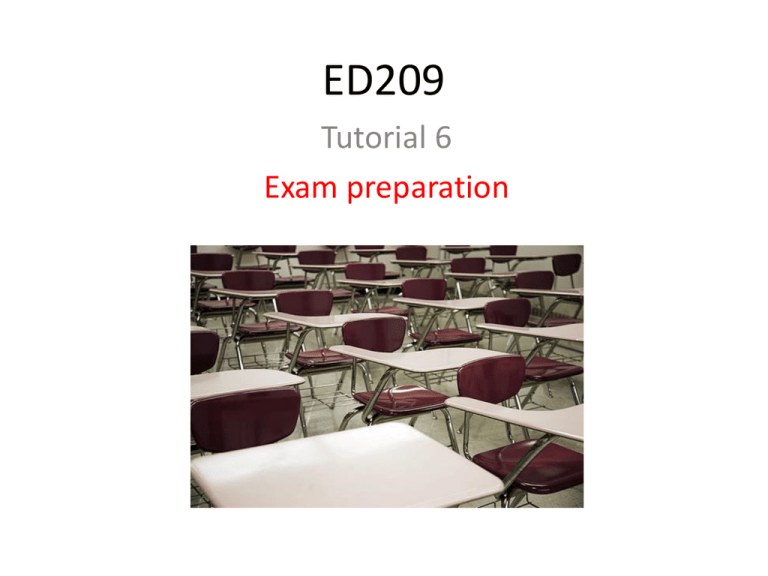
ED209 Tutorial 6 Exam preparation General comments • How is everything going • Any general questions or concerns? Exams: Key Points • • • • • • • • Everyone wants you to pass! Failing an exam is not the end of the world! Don’t worry about what you haven’t covered, work out how to make the best use of what you have done. No-one understands everything – there are bound to be areas where you feel underprepared and confused. Don’t panic when you read exam questions. Almost every exam question is linked directly with something you have covered on the course. You just have to work out the link. Exams are as much about what you understand as what you remember Have a clear plan as to how you intend to use your time in the exam You will probably do a lot of work before the exam. Do it in a planned way, using your time efficiently and conserving your energy – don’t turn your life into a misery because of an exam! What kind of learner are you? • • • ‘I see’ ‘I get the picture’ ‘That’s clear’ • • • ‘That sounds great’ ‘I hear what you’re saying aural ‘That strikes a chord’ • • • ‘It feels right’ ‘It slipped my mind’ ‘Let’s start from scratch’ mind maps visual learner colour code notes pictures, diagrams record notes to tape and play back repeat out loud use rhymes, mnemonics movement walk around as you read notes use big notes (posters) to ‘feel’ words use gestures to remember/link material Revision • • • • Revising for & taking exams involve techniques that can be learned & practiced Everyone revises differently – experiment and see what works best for you But remember: revision should be an active process – the more you think about, manipulate and practice the material, the easier it will be to remember You don’t have to remember every detail – more important to get to grips with parcels of ideas (i.e. foundational theories in developmental psychology) Passive • Re-reading • Copying • Typing notes onto computer • Highlighting Active • Writing index cards • Annotating text (comments) • Mindmapping • Repeating (not reading) out loud • Doing past papers Activity • Work through the following questions in groups & then group as a whole – Your overall feelings about exams & revision? – Aspects or issues that concern or interest you? – What techniques have you used in past exams and which ones have been successful? – What techniques haven’t been successful? Revision cont. Breaks • Build breaks into yr timetable • Revise for 30 – 40 mins → take a break • Break at an interesting point so you are encouraged to return to it Relaxation techniques 20 mins, eyes open or closed 1. Breathe normally, just after breathing out, count silently ‘one’. Count ‘two’ after the 2nd exhalation. Go up to 10. Then start again from one. Do this for 5 mins. 2. If you lose count, start again. 3. Next make your silent count just before you breath in. Do this for 5 mins. 4. Stop counting, spend 5 mins just noticing the sensation of breathing in your body. 5. Spend the last 5 mins noticing the point at which air enters and exits the body (usually lips or nose) Exercise reduces stress Get a good night’s sleep! Positive Attitude Use Phrases Like: • I will work well • I will learn what’s worth learning • I will set myself regular deadlines • I will take regular breaks Don’t use phrases like: • I will work hard – work prioritised above everything else • I will learn every detail – can’t see the wood for the trees • I will sit here until the work is all done – this will make you feel tired • I will not have free time unless I’ve earned it – creates guilt, learning becomes a chore The Exam Day before: • If possible take the day off • Get a good night’s sleep • Don’t spend all day talking about the exam • Don’t eat too much junk food • Use relaxation techniques Exam • Weds 20th Oct, 2.30 – 5.30pm • Allow plenty of time to get there (delays, parking etc) • Take your exam allocation letter & personal ID (with photo & signature) • Wear loose fitting, comfortable clothes, take a jumper. • PENS! Tackling the questions • Answer 3 questions in total • 2 questions from Parts 1-3, each chosen from a different part, and compulsory seen question based on part 4 • Read all of the questions • 5 mins choosing questions and order • Plan! – 5 mins per question – Underline key words in question or paraphrase – What will you include? – How will you answer? • Re-read when finished • Check you’ve done everything! Seen Question • Choose your topic! • Can be any area of child development • Read 3 chapters (http://learn.open.ac.uk/mod/resource page/view.php?id=301136) • Find 2 references independently (use academic search complete or Google Scholar) • Set about researching your answer • Practice writing that answer as if it were an essay TMA • Revise the content and structure for the exam • SAFARI • http://www.open.ac.uk/safari/ • Takes you on guided tour of how to research a topic • What is information? • Planning a search • Conducting that search • Using the information First steps Further searching • • • • • • • • Search database provided by the OU Academic Search Complete (EBSCO Host) http://library.open.ac.uk/find/eresources/databases/linking.cfm?id =403673 Link from your student page Enter search terms (your topic) Separate out key words: e.g. ‘autism’ and ‘false belief’ Choose ‘Full Text’ (to download whole articles) Choosing references • • • • • • • Read through titles Some papers clearly not relevant Select those you feel ‘appear’ suitable Read the Abstract Click on article title, and scroll to Abstract Download copies of the papers you want Click on PDF button by article Activity 2: Seen Question Within your chosen topic area, discuss the extent to which research in developmental psychology, and it’s application, have improved support for children. • • • • What is this question asking you to do? What area are you focusing on? How are you planning to tackle the question? What might be included? → Prepare like a standard essay → Be critical and balanced! Goodbyes! Au revoir Good luck!
